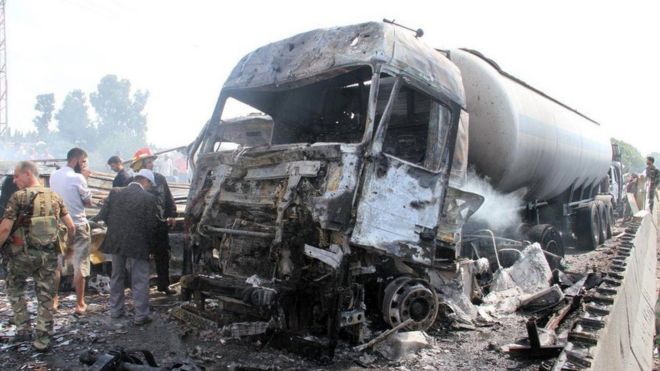 Two explosions hit the Arzoneh motorway bridge at the entrance to Tartous
Two explosions hit the Arzoneh motorway bridge at the entrance to TartousAt least 40 people have been killed in four bombings in government-held areas of Syria and one in a city dominated by Kurdish forces, state media report.
The attacks took place between 08:00 and 09:00 (05:00-06:00 GMT) around Damascus, Homs, Tartous and Hassakeh. It was not clear if they were linked.
The deadliest incident was outside Tartous, on the Mediterranean coast.
Tartous, which hosts a Russian naval base, is the heartland of President Bashar al-Assad’s Alawite sect.
A news agency affiliated to the jihadist group Islamic State (IS) said a suicide bomber had targeted Kurdish militiamen in Hassakeh, without claiming it was responsible.
‘Crowd targeted’
Syria’s official Sana news agency reported that 30 civilians were killed and 45 others injured in the Tartous countryside on Monday morning.
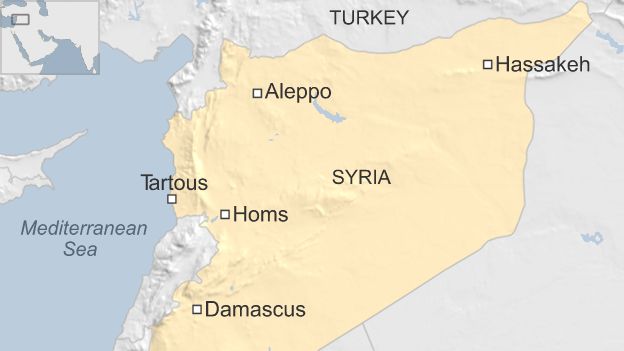
First, a car bomb was detonated on the Arzoneh motorway bridge, a local police source was cited as saying.
Then, as a crowd gathered at the scene to help the wounded, a suicide bomber detonated his explosive belt, the source added.
Tartous had been relatively unscathed by Syria’s five-year civil war until May, when a suicide bomb attack on a bus station by IS militants left dozens dead.
In the central city of Homs, four people were killed and 10 injured when a car bomb exploded at the entrance to the Bab Tadmour district, Sana reported.
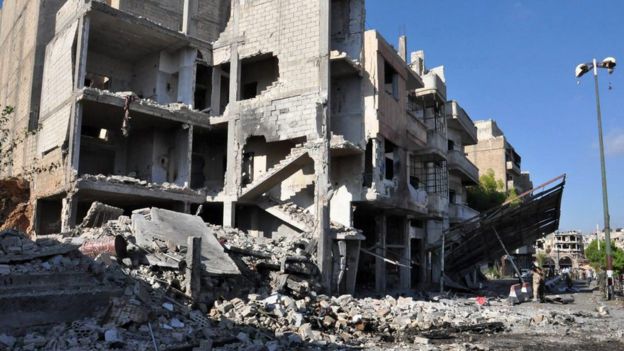
The governor of Homs province said the car bomb targeted a military checkpoint and that the casualties were soldiers.
One person was meanwhile killed in a bombing on a road in Saboura, a heavily-guarded western suburb of Damascus, a police source told Sana.
Opposition activist Yousef al-Boustani said the area was home to security officers and their families and that the attack represented a major security breach.
In Hassakeh, an explosives-packed motorcycle was blown up at the Marsho roundabout, killing five civilians and injuring two others, Sana said.
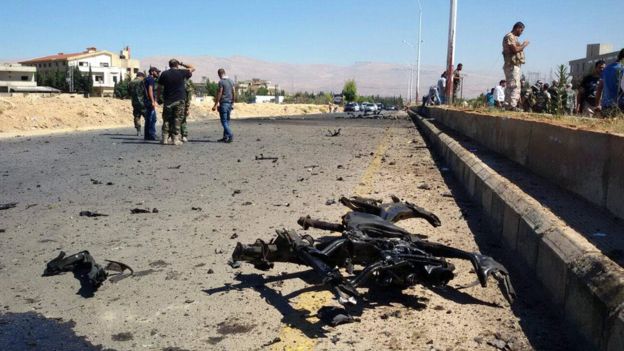 Image copyrightEPA
Image copyrightEPAThe Syrian Observatory for Human Rights, a UK-based group that monitors the conflict in Syria through a network of sources, said three of the dead were Kurdish security personnel, known as the Asayish.
The Kurdish Popular Protection Units (YPG) militia took near complete control of the north-eastern city last month after a week of clashes with government troops.
The Syrian Observatory put the total death toll for Monday’s attacks at 47.
The attacks came as US President Barack Obama and his Russian counterpart Vladimir Putin discussed a ceasefire deal for Syria on the sidelines of the G20 summit in China.
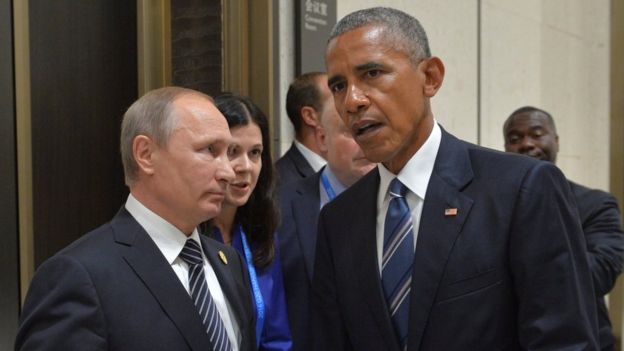 Image copyrightREUTERS
Image copyrightREUTERSMr Obama said he and Mr Putin had had “productive” discussions and had agreed to continue the search for a comprehensive truce.
The US president said: “Given the gaps of trust that exist, that’s a tough negotiation and we haven’t yet closed the gaps in a way where we think it would actually work.
“But my instructions to Secretary [of State John] Kerry and Mr Putin’s instructions to [Foreign Minister Sergei] Lavrov were to keep working at it over the next several days.”
The US is particularly concerned by the deteriorating conditions in and around the divided second city of Aleppo, where rebel-held districts are once again under siege after government forces advanced on Sunday.
Turkish President Recep Tayyip Erdogan, also at the G20, said he had urged world powers to create a “safe zone” in Syria, with a “no-fly” element, that would help control the flow of migrants.